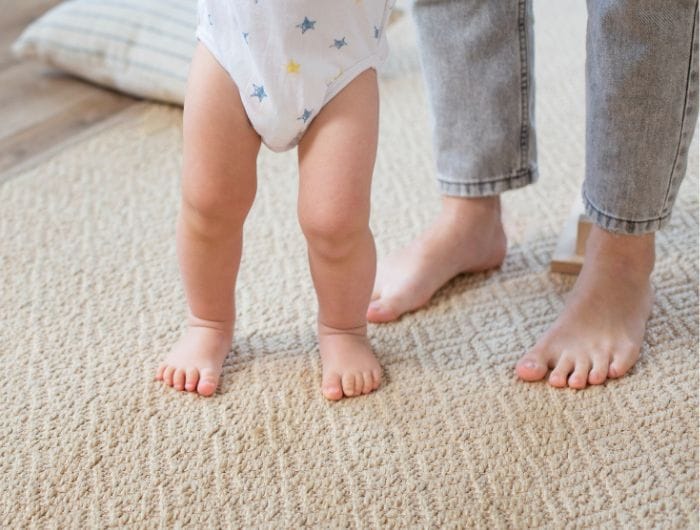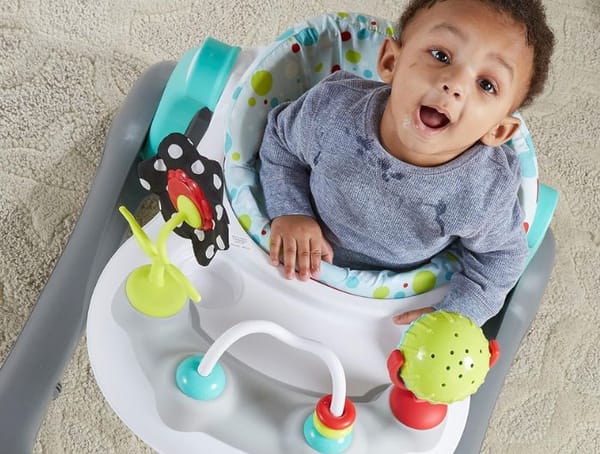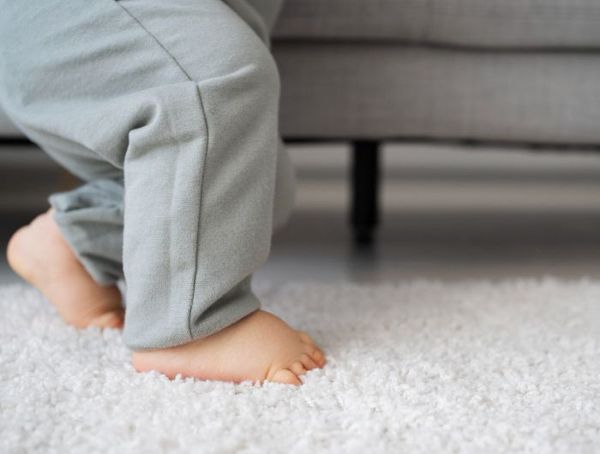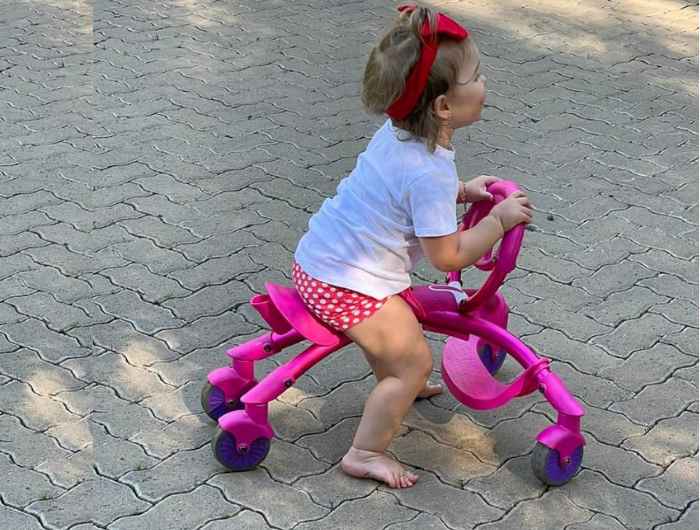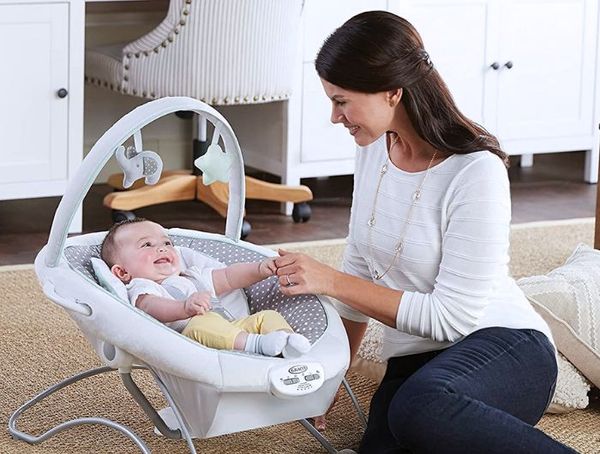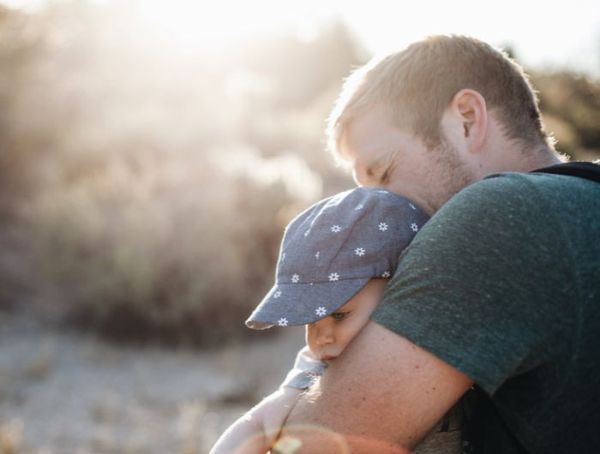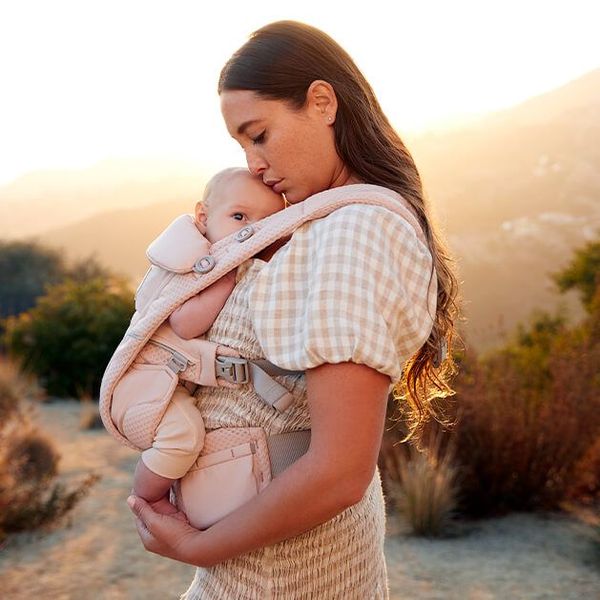A baby's first steps is a magical moment. But let's be honest, the journey to those precious first steps is different for every baby.
Some might sprint right out of the gate, while others prefer to take a more leisurely stroll down the path of development. It's all about giving them the encouragement and opportunities they need to practice this new skill.
When Do Babies Typically Start Walking?
Most babies take their first steps between 9 and 12 months of age and are walking well by the time they're 14 or 15 months old. But don't set your calendar by this! Every baby starts walking on their own schedule.
So, if your cutie pie is 16 months and prefers crawling over walking, don't worry! Babies develop at different rates and it's perfectly okay. Let them take their time, because when those first steps come, they'll be worth the wait!
'The Wonder Weeks' covers the weekly development of a baby during their first 20 months. It's a great resource for parents who are wondering whether their baby is ready to start taking those first steps.
Signs Your Baby is Ready to Walk
Your baby might start pulling themselves up to stand using the couch or coffee table for support. You'll see them testing their balance, maybe even letting go for a second or two. This is a huge sign that they're building the strength and balance necessary for walking.
You might notice your baby doing a lot of squats. This is their adorable way of practicing to stand up and sit down. It might look like they're just playing, but in reality, they're working out their leg muscles and improving their balance.
Another sign to watch out for is your baby starting to walk on their knees or toes. This is often a prelude to full-blown walking.
And don't forget about the 'walking' reflex. If you hold your baby under their arms and lean them slightly forward, their little feet will start to step reflexively. This doesn't mean they're ready to walk just yet, but it's a good sign that they're getting there.
Another fun milestone is when your baby starts to cruise. That's when they shuffle along while holding onto furniture.
All these signs point to one thing: your baby is learning to support their own body weight. So, keep an eye out for these signals, because they mean that your baby will walk soon.
Stages of Walking Development
Stage one is often crawling. But here's a fun fact - some babies skip this stage altogether! That's right, not all babies crawl. Some might scoot on their bottoms, wriggle on their bellies, or roll around to get where they want to go. And some just move straight to pulling themselves up.
Next up is pulling up to stand. This is when your little one starts to use anything within their reach - be it your leg, a toy, or a piece of furniture - to pull themselves up into a standing position. It's like they're saying, "Look, mom, I'm big now!"
After they've mastered pulling up, we enter the 'cruising' stage. This is when your baby moves around while holding onto furniture. It's their way of taking a trial run before they start walking independently. You'll often see them shuffling sideways along the couch, their tiny hands gripping tightly.
And finally, the moment you've been waiting for - standing independently. This is the grand finale when they star to walk without support.
How to Encourage Your Baby to Walk
Setting up a safe and baby-proof space is crucial. Clear the area of any sharp objects or tripping hazards. This way, your baby can practice walking without you having to worry about them getting hurt.
Activities to Encourage Walking
One fun way to help your baby walk is by setting up a 'treasure hunt.' Tape toys or objects close to their eye level on a wall. Your baby will be motivated to stand up and reach for them, practicing their balance in the process.
Playing with their feet and toes is another great strategy. Make running and jumping motions with their legs to help them get a feel for these movements.
Assisted walking is another excellent method. Stand behind your baby, hold them under their arms and support their trunk and walk with them. This not only helps them get a sense of balance but also strengthens their leg muscles.
Another activity involves using a hankie or sock. Each of you holds one end, gently guiding your baby to walk towards you. This gives them the confidence to move forward while knowing you're there for support.
Playing games can also be beneficial. For instance, try the 'Mommy Says' game, where you instruct your baby to stand, sit, or walk and they follow your commands.
Baby Walkers
Let's talk about baby walkers. The American Academy of Pediatrics isn't a big fan of these because they can limit muscle development and pose safety risks. A safer alternative is push-toys. They can motivate your baby to walk while offering support.
Letting your baby walk barefoot as much as possible can help build muscle tone and improve balance. It gives their tiny feet direct contact with the ground, which is great for developing coordination.
Remember, every baby is unique and learns to take steps at their own pace. So, keep the environment safe, stay patient, and shower your little one with lots of love and encouragement. Before you know it, they'll be running circles around you!
What to Do If Your Baby Isn’t Walking Yet
Remember, every baby develops at their own pace, they’re learning to walk at their own pace and that's perfectly okay.
If your baby hasn't started walking by 18 months, it's generally a good idea to talk to your pediatrician. They can check for any underlying issues and give you the best advice. Keep in mind, this doesn't mean something is wrong. Some kids are just late bloomers!
In the meantime, continue to encourage your baby. Play games, provide safe spaces for them to explore, and shower them with praise for their efforts.
Conclusion
Remember, teaching your baby to walk is a journey filled with laughter, a few stumbles, and lots of memorable moments. Try out different activities like treasure hunts, games, and assisted walking to encourage your little one. And don't forget about the wonders of barefoot exploration for muscle tone and balance!
But most importantly, let's not rush this beautiful process. Be patient and supportive in helping your baby learn to walk. Each baby is unique and they'll walk when they're ready.
So, keep the environment safe, shower your little one with encouragement, and enjoy these precious moments. After all, they grow up so fast, don't they?
Thank you for reading Mother Bear Reviews, your favorite parenting blog!


